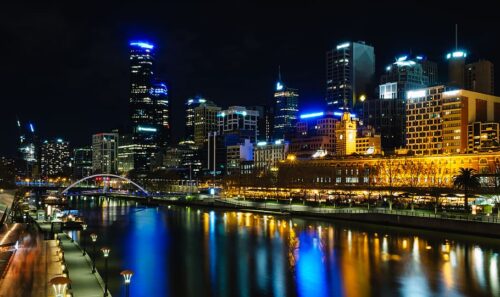Image Courtesy of Wallpaper Flare.
You’ve probably flown over a city at night and noticed the bright glow of lights staring back at you through the airplane window. As intriguing and surreal as it feels to see such a sight, these lights are disrupting the behavioral patterns and circadian rhythms of many organisms across the globe, from insects and bats to bioluminescent creatures and humans. In his newly released book, The Darkness Manifesto, Johan Eklöf describes the myriad consequences related to light pollution and urges readers to defend the darkness.
The majority of nature’s activities, such as mating and pollination, occur at night because eighty percent of all organisms are nocturnal. Humans are diurnal organisms (active during the day) and, as a result, have resorted to artificial light to extend our activities into the night. Eklöf claims that we have entered a new era: the Anthropocene, in which humans have had a critical impact on the Earth’s ecosystems. In particular, he argues that man-made sources of light are disrupting Earth’s natural rhythms by generating light pollution.
Eklöf devotes several chapters to describing the ways in which light pollution has thrown off the reproductive cycles of organisms across the planet. For instance, he claims that the pollination rate of some plants like apple trees has slowed down because moths, which serve as pollinators, get easily confused by artificial sources of illumination. For animals like our beloved friend Nemo, the consequences of light pollution are as severe as eggs failing to hatch since clownfish larvae rely on the darkness to signal when it is time to break free from their sacs. Without complete darkness at night, the behavioral patterns of organisms are becoming increasingly out of tune, and as a result, the ecosystems they inhabit are being destroyed.
But it isn’t just plants and animals that are affected. We humans are facing serious consequences as well. Because humans aren’t nocturnal, we rely on our natural sleep cycles to rest. But true rest is difficult to achieve when we are using our phones too late into the night. Blue light from our phones tricks our brains into thinking it is still daytime, so we produce insufficient levels of our natural sleep hormone, melatonin, making it difficult to fall asleep. Similarly, Eklöf states that people who work night shifts are at a higher risk of hormonal cancers such as breast and prostate cancer. We can prevent a multitude of serious health conditions by restoring our natural circadian rhythms and avoiding light at night.
In his manifesto at the end of the novel, Eklöf calls upon readers to cherish and learn more about the darkness due to its importance in our behavioral patterns. Some countries, like France, are already moving towards decreased use of artificial light at night, and Eklöf hopes that more countries will follow suit. “The darkness is not the world of humans. We’re only visitors,” Eklöf reminds readers. It’s not too late to change our habits and start protecting the darkness.

